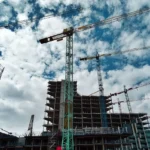In the realm of real estate development, financing is key to turning visions into reality. Among the various funding options available, investment capital stands out as a vital component that can determine the success or failure of a project.
This blog explores the essential reasons why investment capital is not only beneficial but crucial in the landscape of real estate development.

1. Boosting Project Credibility
When developers seek financing for their projects, one of the first impressions they must create is credibility. Investment capital significantly enhances this credibility by demonstrating the developer's commitment and confidence in their own project. When investors see that a developer is willing to invest their own money alongside external funds, it reinforces the project's reliability and potential for success. Additionally, investment capital serves as a signal to other market players. Banks and lenders are more likely to provide debt financing when they see substantial capital contributions. This inherent confidence, based on the developer's financial participation, is crucial as it attracts more support and validation from potential partners and investors.
2. Enhance Financial Stability
Another important reason for a developer to prioritize investment capital lies in the financial stability it provides. Unlike debt, which requires regular payments along with interest, equity capital does not impose such burdens, allowing developers to focus on project execution and growth. This flexibility is essential, as unforeseen circumstances often arise in real estate development. In times of financial uncertainty or cutbacks, having a healthy capital reserve can serve as a cushion. It enables developers to maintain operations, explore new opportunities, or adjust strategies without the immediate stress of accumulating debt obligations. This ability to absorb risks can make a significant difference in a volatile market. Additionally, incorporating investment capital into the financing structure can lead to better budgeting and resource allocation. This provides a foundation for managing cash flow more effectively, ensuring the project progresses smoothly without unexpected financial setbacks that could derail its development.
3. Attracting Additional Financing
Investment capital not only helps strengthen financial health but also acts as a magnet for attracting further investments. Investors generally prefer projects that demonstrate strong capital backing, as this reflects a lower-risk profile. When a developer secures a significant amount of capital, it creates a ripple effect that invites institutional funds and venture capital to participate. Additionally, having investment capital enhances the developer’s negotiating power. With a solid financial foundation, they can approach lenders with confidence, which is likely to result in better loan terms and lower interest rates. They can also facilitate strategic partnerships that add value to the project, expanding its reach and potential profit margins.
4. Facilitate Risk Management
Risk is an inherent part of real estate development, and understanding how to mitigate it is essential. One of the main benefits of using investment capital is its ability to act as a buffer against potential setbacks. With a well-capitalized project, developers have the flexibility to adapt to challenges without the immediate pressure of debt. This inherent adaptability is vital for navigating market fluctuations or unforeseen challenges. Additionally, investment capital encourages a more cautious approach to project planning and execution. Developers with sufficient capital are more likely to conduct thorough market analyses, comprehensive risk assessments, and consider all possible scenarios before proceeding. This proactive approach can lead to more informed decision-making and, ultimately, a smoother project execution.
5. Allow Long Term Planning
Investment capital plays a crucial role in empowering developers to adopt a long-term perspective. Unlike debt financing, which often comes with strict time constraints, capital allows developers to focus on sustainable growth rather than short-term financial gains. This vision is vital, especially for projects that require extended timelines to mature. With a strong capital foundation, developers can invest in long-term strategies such as community engagement and sustainable practices, which align with recent real estate trends. By fostering relationships and prioritizing quality over speed, they can ensure the project's continued success and viability. Additionally, this long-term approach encourages a culture of innovation and adaptability. Developers can explore new ideas and respond to changing market conditions without being constrained by immediate financial pressures, ultimately leading to more impactful and successful projects.
6. Foster Strategic Partnerships
In today's real estate landscape, collaboration is key. Having investment capital enables developers to more easily enter into strategic partnerships. Investors are more likely to collaborate on projects where they see a substantial equity stake, as this can mitigate risks and share the financial burden. Investment capital fosters an environment of trust and shared objectives among partners. These partnerships can take various forms, including joint ventures, co-investments, or even alliances with service providers. By pooling resources and expertise, developers can manage costs while improving the project's quality and innovation. This collaborative approach not only diversifies risk but also opens the door to more lucrative opportunities.
7. Drive Sustainable Growth
At the core of real estate development success lies the principle of sustainable growth. Investment capital supports developers in pursuing initiatives that emphasize long-term value over quick profits. This is especially important as the industry moves toward more socially and environmentally responsible practices. Developers backed by capital can invest in projects that benefit the community, improve infrastructure, and protect the environment. Moreover, sustainable projects often gain greater community support, which can lead to fewer delays and obstacles. This type of alignment with public sentiment positions developers favorably with investors and potential buyers. In short, investment capital empowers developers to lead toward a greener future, demonstrating that responsible practices can coexist with commercial viability.












